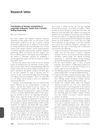 35 citations,
August 2004 in “Epilepsy & behavior”
35 citations,
August 2004 in “Epilepsy & behavior” Extended-release divalproex is better tolerated and more effective for seizures and psychiatric symptoms than delayed-release divalproex, but doesn't reduce hair loss.
 23 citations,
February 2004 in “Clinical and Experimental Ophthalmology”
23 citations,
February 2004 in “Clinical and Experimental Ophthalmology” A boy with chromosome 13q deletion syndrome developed eye cancer, a woman with breast cancer lost vision due to a rare side-effect of her treatment, a man's vision worsened after using a hair loss drug, and two rare disorders were discussed. Optical Coherence Tomography is useful for diagnosing and monitoring these conditions.
 8 citations,
October 2018 in “Journal of Investigative Dermatology”
8 citations,
October 2018 in “Journal of Investigative Dermatology” Many patients with Alopecia Areata in Korea experience anxiety, depression, and reduced quality of life, which are often unrelated to the severity of hair loss.
 5 citations,
August 2015 in “British journal of dermatology/British journal of dermatology, Supplement”
5 citations,
August 2015 in “British journal of dermatology/British journal of dermatology, Supplement” The top research priorities for congenital ichthyosis include long-term side effects of oral retinoids, best topical treatments, and treatments for itch and hair loss.
 September 2017 in “Pediatric Dermatology”
September 2017 in “Pediatric Dermatology” The document concludes that an experimental drug may help wound healing in Epidermolysis Bullosa, links Hydroa vacciniforme to EBV, discusses diagnosing hair loss disorders, finds many children with eczema have allergies, reviews the safety of a skin medication in children, notes side effects of a Duchenne's treatment, and identifies a marker for pediatric mastocytosis.
 July 2014 in “Disease-a-Month”
July 2014 in “Disease-a-Month” The document gives treatment advice for various skin conditions, like using metronidazole for perioral dermatitis and minoxidil for hair loss.

The document discusses various diseases of the outer ear, categorized by symptoms like redness, crusts, bumps, pus-filled lesions, lumps, ulcers, and hair loss.
34 citations,
July 2006 in “Clinics in dermatology” Endocrine diseases in dogs often cause skin problems, with hypothyroidism and hyperadrenocorticism being common and leading to hair loss and infections.
 31 citations,
May 2008 in “Drug Discovery Today: Disease Mechanisms”
31 citations,
May 2008 in “Drug Discovery Today: Disease Mechanisms” Different hair growth problems are caused by genetic issues or changes in hair growth cycles, and new treatments are being developed.
 8 citations,
January 2018 in “Middle East Journal of Digestive Diseases”
8 citations,
January 2018 in “Middle East Journal of Digestive Diseases” A man with complete hair loss and ulcerative colitis regrew hair after treatment with azathioprine.
 January 2013 in “kerbala journal of pharmaceutical sciences”
January 2013 in “kerbala journal of pharmaceutical sciences” Low zinc levels are strongly linked to hair loss in adult premenopausal women.
 41 citations,
October 2017 in “International Journal of Women's Dermatology”
41 citations,
October 2017 in “International Journal of Women's Dermatology” Most pregnant women experience skin darkening and hair changes, with these effects usually going away after giving birth.
 40 citations,
May 2010 in “Australasian Journal of Dermatology”
40 citations,
May 2010 in “Australasian Journal of Dermatology” Chronic hair shedding may be caused by less variation in hair growth times and might stop on its own after several years.
20 citations,
April 1959 in “A M A Archives of Dermatology” Alopecia mucinosa causes red, raised skin patches and hair loss.
 9 citations,
November 2012 in “Hepatology Research”
9 citations,
November 2012 in “Hepatology Research” A man lost all his hair permanently after hepatitis C treatment, a side effect not seen before.
8 citations,
March 2011 in “Endocrine” A new gene mutation causes vitamin D-resistant rickets and hair loss in two siblings.
5 citations,
March 1943 in “Archives of Dermatology and Syphilology” A rare case of severe scalp hair loss and nail issues in keratosis follicularis was observed.
 1 citations,
April 2017 in “Journal of Investigative Dermatology”
1 citations,
April 2017 in “Journal of Investigative Dermatology” Tofacitinib may help regrow hair in severe alopecia areata, but results differ greatly between people.
1 citations,
January 2014 in “Indian journal of dermatology, venereology, and leprology” Papular mucinosis can cause eyebrow hair loss, but treatment can lead to regrowth.

Combining hydroxychloroquine and pimecrolimus can effectively treat hair loss from discoid lupus.
 December 2023 in “Journal of family medicine and primary care”
December 2023 in “Journal of family medicine and primary care” Hair loss in Saudi Arabia causes a low psychosocial impact, with less effect on those without a family history of hair loss.
November 2019 in “BMC veterinary research” The hair loss in Belgian Blue crossbred calves was caused by a diet issue, not by disease or infection.
 68 citations,
March 1965 in “The BMJ”
68 citations,
March 1965 in “The BMJ” Hormones and genetics affect hair growth and patterns, with some changes reversible and others not.
 42 citations,
October 2012 in “Dermatologic Clinics”
42 citations,
October 2012 in “Dermatologic Clinics” Trichoscopy is a useful tool for diagnosing different hair and scalp diseases without surgery.
 24 citations,
September 2002 in “Dermatologic Surgery”
24 citations,
September 2002 in “Dermatologic Surgery” The place where hair is transplanted can affect its growth and survival rates.
 13 citations,
January 2015 in “International Journal of Trichology”
13 citations,
January 2015 in “International Journal of Trichology” Higher lead and cadmium, and lower zinc and iron levels in the blood might be linked to chronic hair loss in women.
 11 citations,
October 2016 in “Pediatric dermatology”
11 citations,
October 2016 in “Pediatric dermatology” Stopping the use of fluocinolone oil containing balsam fragrance improved hair regrowth in children allergic to it.
 6 citations,
July 2003 in “Journal of Womens Health”
6 citations,
July 2003 in “Journal of Womens Health” Experts say proper treatment and sensitivity are important for women's facial skin issues like acne and unwanted hair.
4 citations,
October 2018 in “JAMA Dermatology” Ruxolitinib may help treat hair loss and symptoms in patients with chronic graft-versus-host disease.
2 citations,
January 2022 in “Anais brasileiros de dermatologia/Anais Brasileiros de Dermatologia” Chemical hair straighteners can cause scalp and hair damage, but long-term effects are unclear.





















